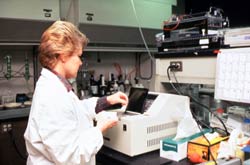


|
|
|
|
|
|
|
|
|
|
|
|
||||||||||||||
|
||||||||||||||
|
|
||||||||||||||
|
||||||||||||||
|
Posted 2/11/2008 USC to offer graduate education programs for
The leadership of the University of South Carolina and the NOAA National Center for Coastal Ocean Sciences has signed a joint memorandum of agreement to encourage collaboration and research partnerships with the NOAA Center for Coastal Environmental Health and Bimolecular Research (CCEHBR) in Charleston. The scope of this agreement spans an array of related environmental and public health research and education activities.
The CCEHBR operates a 43,000-square-foot laboratory on the grounds of the S.C. Department of Natural Resources Marine Resources Center at Fort Johnson near the mouth of Charleston Harbor. Under the agreement, the university will offer appropriate graduate education programs for CCEHBR staffers. In exchange, USC faculty and graduate students will have use of the Charleston facility for research related to environmental health, analytical chemistry, ecotoxicology, , environmental genomics, coastal bioterrorism and the impacts of urbanization. The agreement also facilitates joint research projects (funded and otherwise) between USC partners and CCEHBR researchers. USC partners covered under the agreement are the Arnold School of Public Health, including its Department of Environmental Health Sciences and the Center for Public Health Preparedness. Other partners are the Department of Chemistry and Biochemistry and the Baruch Institute for Marine and Coastal Sciences. "The Arnold School has had a long history of productive collaborations with CCEHBR over the past 15 years. The CCEHBR director, Dr. Geoffrey Scott, and several other CCEHBR scientists are adjunct faculty in the Arnold School. This agreement expands opportunities for CCEHBR collaboration to other frequent Arnold School collaborators in environmental chemistry and marine sciences. "On the CCEHBR side, they have a very talented pool of more than 100 employees that can benefit from new and continuing education programs in public health and environmental sciences available at USC," said Dr. Tom Chandler, interim dean of the Arnold School of Public Health. The National Ocean Service, an arm of the National Oceanic and Atmospheric Administration, operates the Charleston laboratory. The facility's major research areas include marine toxins and harmful algal blooms, environmental quality and coastal ecosystem health, land use and presence of chemical contaminants in the marine environment, and genetic characterization of fish and shellfish. |
| Columbia, SC 29208 • 803-777-7000 • sphweb@gwm.sc.edu | © University of South Carolina Board of Trustees |
